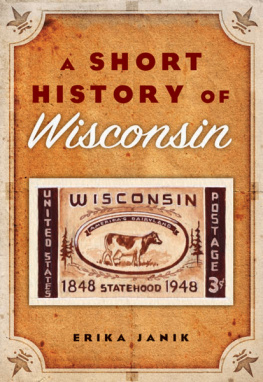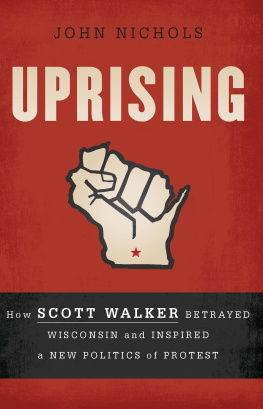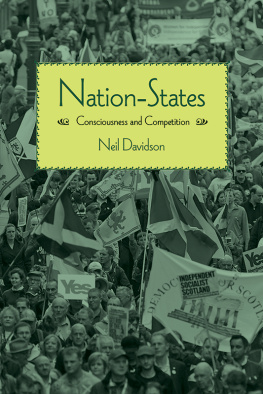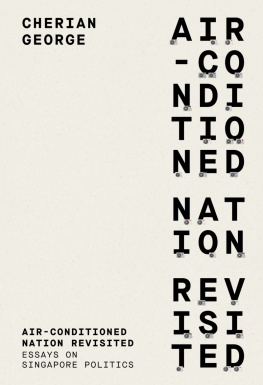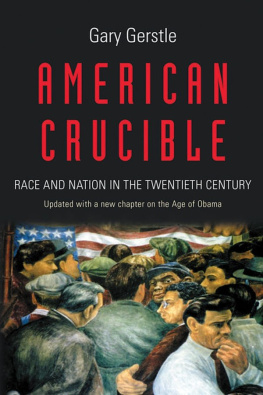Photographs identified with WHi or WHS are from the Societys collections; address requests to reproduce these photos to the Visual Materials Archivist at the Wisconsin Historical Society, 816 State Street, Madison, WI 53706.
Karim Tiros Claims Arising: The Oneida Nation of Indians of Wisconsin and the Indian Claims Commission, 19511982 previously appeared in the American Indian Law Review 32 (2008).
A nation within a nation : voices of the Oneidas in Wisconsin / edited by L. Gordon
McLester III and Laurence M. Hauptman.
p. cm.
Includes bibliographical references and index.
ISBN 978-0-87020-454-8 (hardcover : alk. paper) 1. Oneida Indians Wisconsin
History 20th century. 2. Oneida Indians Politics and government. 3. Indians of North
America Wisconsin History 20th century. I. McLester, L. Gordon. II. Hauptman,
Laurence M.
Contents
Looking Back: The Oneida Nation of Indians of Wisconsin in the Early 1970s
Jack Campisi
An Environmental History of Oneida Life at Duck Creek: Then and Now
Carol Cornelius and Loretta Metoxen
The Oneida Methodist Church, 18161975
Evelyn E. (Schuyler) Smith-Elm
The Indian New Deal at Oneida
Oscar Archiquette
Codeswitching in the Oneida WPA Texts
Clifford Abbott
Cherry Picking: A WPA Story in Oneida and English
Lewis Webster
A Tribute to She Remembers [Maria Christjohn Hinton] with Reflections on Oneida Language Classes in the 1970s
Ernest Stevens Jr.
Oneida Education: Past, Present, and Future
Thelma Cornelius McLester
The Origins of the Oneida Nation Library
Judy Cornelius
Sybil Carter and Her Legacy
Patricia Matteson
Reviving Oneida Lacemaking
Betty McLester and Debra Jenny
Reminiscences of Oneida Life in Milwaukee, 19201975
Opal Skenandore
Remembering Oneida Veterans and Their Sacrifices: A Personal Journey
Jerry Danforth
Oneidas in World War I
Loretta Metoxen
Three Memoirs of Veterans
Edmund Powless, Franklin L. Cornelius, and Kenneth William Webster
The Wisconsin Oneidas, 18871933
L. Gordon McLester III
The Wisconsin Oneida Tribal Government under the Indian Reorganization Act: The New Deal Years, 19331941
Loretta Webster
A Contrast with Oneida: Menominee Termination and Restoration, 19541973;
Ada Deer
Claims Arising: The Oneida Nation of Indians of Wisconsin and the Indian Claims Commission, 19511982;
Karim M. Tiro
The Wisconsin Oneidas and Termination, 19431956
Laurence M. Hauptman
Federal Indian Policies and the Wisconsin Oneidas: From the Indian Reorganization Act (1934) to the Indian Self-Determination and Education Assistance Act (1975)
Loretta R. Webster
Reminiscences of Working for the Wisconsin Oneida Tribal Government in the 1960s and 1960s: Part I
Althea Schuyler
Reminiscences of Working for the Wisconsin Oneida Tribal Government in the 1950s and 1960s: Part 2
Eva Danforth
Irene Moore: A Memoir
Irene Moore
Norbert Seabrook Hill Sr.
Megan Minoka Hill and Norbert Hill Jr.
Purcell R. Powless
L. Gordon McLester III
An Interview with Robert L. Bennett
Joe B. Frantz
Protecting Indian Sovereignty
Ernest Stevens Sr.
Preface
Throughout the Indigenous nations located within the United States, the term sovereignty is invariably used when describing the inherent authority of their nations. Usually, the term is invoked in the course of protecting some right as in, The application of the states taxes to our land will undermine our sovereignty! or as a justification for an assertion of power as in, Building this casino is an exercise of our sovereignty! It is referenced in whole and absolute terms and on occasion is tailored to suit a particular purpose, e.g., to assert the nations cultural sovereignty or its economic sovereignty. Robert Odawi Porter, Conceptions of Indigenous Sovereignty
THIS BOOK IS THE FOURTH AND CONCLUDING VOLUME in a series on the history of the Oneida Nation. In 1988, Syracuse University Press published The Oneida Indian Experience: Two Perspectives, which provided a historical overview of Oneida communities in the United States and Canada. In 1999, the University of Wisconsin Press published The Oneida Indian Journey: From New York to Wisconsin, 17841860, which described the pressures on those Indians during the time they made treaties with the federal government (1784 to 1838), the reasons for their migration out of the Empire State, and their adjustment to their new home in the Badger State. In 2006, the University of Oklahoma Press published The Oneida Indians in the Age of Allotment, 18601920, which focused on the Wisconsin communitys loss of more than sixty-five thousand acres as a result of congressional and state legislative actions in the wake of the Dawes Act of 1887. As was true in the preceding volumes in this series, the editors of A Nation Within a Nation: Voices of the Oneidas in Wisconsin do not simply view these Native Americans as victims acted upon by white outsiders; they present the Oneidas as actors in their own history.
Although not new by any means, the term sovereignty has been used more frequently in Indian country over the past four decades. Anyone spending time in a Native American community soon realizes that the word has a distinct, solemn meaning when used by Indians, and has little to do with its use in a Euro-American context. In western thought, sovereignty connotes a political-legal reality and refers to the supreme and ultimate authority that exists within any political unit or association or territory. A sovereign power is deemed free from all other authorities and possesses no rivals within its jurisdiction.
Native Americans have never accepted this definition, believing instead that they can retain elements of sovereignty even if they are not free from all other authorities. As scholars David Wilkins and K. Tsianina Loma -waima note, not even an international superpower such as the United States possesses truly unlimited sovereignty. The American federalist system reserves certain rights and powers to the states and people rather than to the federal government, for example, and treaties made with foreign nations or with Indian nations also limit Washingtons powers. In the real world, sovereignty operates within constraints. Certainly the colonial process known as frontier expansion has imposed severe restraints on Native Americans. The United States Supreme Court has added to these constraints, deeming Indian nations domestic dependent nations since 1831, and, in 1903, declaring that the Congress had plenary power allowing it to abrogate federal-Indian treaties without tribal consent. Nevertheless, Native Americans emphasize that they were sovereign nations at the time of European contact and that they remain sovereign nations now.



